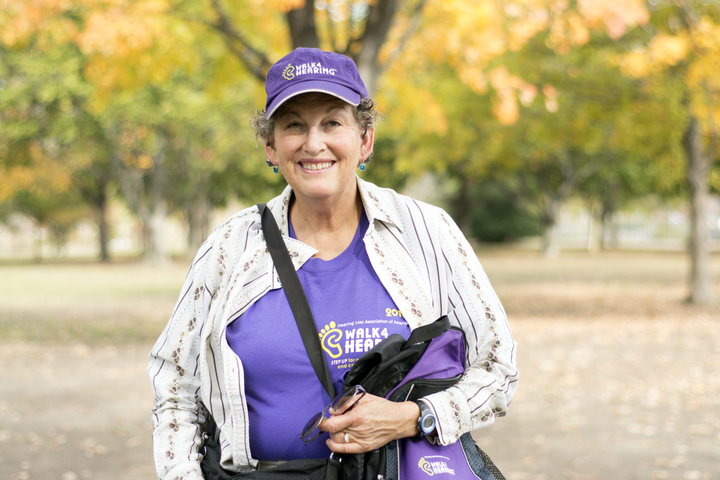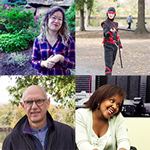Faces Behind the Screen: Sandy
Quick Links
<< Return to all “Faces Behind the Screen” stories
Sandy’s a retired teacher of the deaf. She spent 30 years working in New York City; 20 with Deaf education, and 10 with special ed.
She grew up with mild hearing loss and identifies as deaf but does not know sign language.
How do you prefer to communicate?
Just listening, just talking. I took an ASL class, but I forgot it all. A lot of my classes in high school, too.
What is your first memory of struggling to communicate with other people?
My mother had a hearing loss. My grandmother had hearing loss, too. When I was in grade school, I had a speech deficit.
I had 10 years of speech therapy. I hated the speech therapy. But I learned to talk. I had a mild hearing loss. I didn’t want hearing aids.
But I was told, when I was getting to grow older, that I was going to go completely deaf, which I am now. But they told me, and I was in denial.
When I eventually got a hearing aid when I was 13, I refused to wear it. When I was in high school, I refused to wear my hearing aid, put it in a drawer. I wanted to be accepted like everybody else.
“I didn’t do well in school. In 1964, at that time, they didn’t have teachers of the deaf like I was.”
How did your hearing loss affect everyday life when you were growing up?
I didn’t do well in school. In 1964, at that time, they didn’t have teachers of the deaf like I was. They didn’t acknowledge it. They didn’t put me up front. And I would be in classrooms where I didn’t hear what was going on.
And I was used to thinking of myself as stupid because I couldn’t hear. Like, kids would be laughing and joking. And, like the game Telephone, I would miss out [on those kind of activities].
I had talking problems. I had eyesight problems. I got the thickest lenses you can imagine. So I was a weirdo. Like, my hearing, my vision, my teeth, my speech– I was an outcast. And I grew up this way.
“If I didn’t see people, I didn’t hear them.”
How did your cochlear implants change things?
When cochlear implants came out, they had a severe-to-profound classification [for hearing loss]. At that time I was severe to profound.
I got my first cochlear implant in 1999 and the second one five years ago. The second one is a thousand times better than the first.
[I had no hearing] left in the high frequencies, nothing. And then I had some hearing in the mediums and [could hear] some loud noises.But speech was terrible. Because if you don’t get high frequencies, the consonants — the T-H, the K, the S, F — you don’t understand speech. And you could read lips, but it was hard. And I was at the point for years. If I didn’t see people, I didn’t hear them.
I was terrible on the phone. They didn’t have the captioned phone yet. It was a struggle, real struggle. When I would go to shows, I’d have to read the [transcript] before and then see it and read it again.
“[The world is] definitely more accessible, but we’ve got a long way to go.”
Do you feel like the world is more accessible or less accessible than it used to be?
It’s definitely more accessible, but we’ve got a long way to go.
I have two kids. It’s was 50/50 chance they were deaf. My daughter is hearing and my son has a hearing loss, but it didn’t start until 19. And now he has two hearing aids. But as he gets older, the technology will get better and better.
“People forget it. They don’t think about it. You don’t see it. So it’s ignored.”
What do you think is a common mistake hearing people make when interacting with d/Deaf and hard of hearing people?
Well, I was coming home from [the Boston airport] on the bus last night — I just came home from scuba diving in the Cayman Islands — and I’m sitting next to a blind fellow. And he’s in a wheelchair. And he has [a dog] for the blind. When people see him, when he gets off the bus, they know how to help him.
When I was on the plane earlier we were sitting in the tarmac for 45 minutes. I didn’t know what was going on. So, nobody comes up to you and says, this is what’s happening. There were mechanical problems. I didn’t know what was going on. Even if you tell the flight attendant, “I don’t hear well,” they do not make an effort to accommodate you.
People forget it. They don’t think about it. You don’t see it. So it’s ignored.
—
Thank you to the Hearing Loss Association of America (HLAA) for hosting this series of interviews at the New England Walk4Hearing.
Faces Behind the Screen is a storytelling project focusing on members of the Deaf and hard of hearing community.





